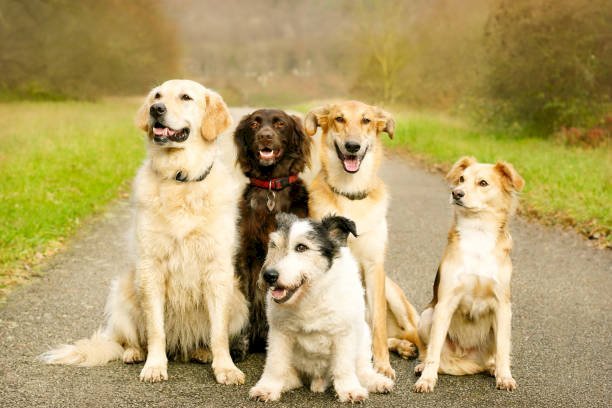Most Loyal and Hardy Canadian Dog Breeds

Canada’s vast, rugged terrain and extreme weather conditions have played a crucial role in shaping some of the world’s most resilient and loyal dog breeds. These dogs were originally bred to assist humans in hunting, guarding, herding, and surviving in harsh, snowy landscapes. Over time, they’ve earned reputations not just for their strength and endurance, but also for their unwavering loyalty and deep bond with their human companions.
If you're looking for a canine companion that’s brave, dependable, and devoted, exploring a Canadian dog breed could be the perfect place to start. These breeds are not only suited to colder climates and outdoor living but also excel as family pets, working dogs, and adventure buddies.
In this blog, we highlight some of the most loyal and hardy Canadian dog breeds, their unique characteristics, and why they continue to be beloved around the world.
1. Labrador Retriever
While often associated with the United States and England, the Labrador Retriever’s roots trace back to Newfoundland, Canada. Originally bred to help fishermen haul nets and retrieve fish from icy waters, Labradors are tough, intelligent, and remarkably affectionate.
Why they're loyal and hardy:
-
Strong swimming ability and water-resistant coat
-
Excellent temperament with children and adults alike
-
Quick learners and eager to please
-
Thrive in active environments, especially outdoors
Labradors are now one of the most popular dog breeds globally, valued equally for companionship, therapy work, and service roles.
2. Newfoundland Dog
The Newfoundland dog is a large, powerful working breed that also originated in Newfoundland. Known as “gentle giants,” these dogs were bred to assist fishermen with rescue operations and heavy hauling.
Notable traits:
-
Thick double coat for cold water protection
-
Webbed feet for strong swimming ability
-
Incredibly calm, gentle, and loyal
-
Often instinctively protective of children
Newfoundlands are especially suited to families looking for a large, affectionate, and watchful pet that can handle cold environments with ease.
3. Canadian Eskimo Dog (Qimmiq)
One of the oldest and rarest indigenous Canadian dog breeds, the Canadian Eskimo Dog, or Qimmiq, was used by Inuit people for sled pulling and hunting. These dogs are highly valued for their strength, endurance, and deep bond with their human pack.
Breed characteristics:
-
Extremely hardy and built for sub-zero temperatures
-
Strong work ethic and high energy levels
-
Loyal to their family but wary of strangers
-
Thrive in colder climates with plenty of outdoor activity
They require experienced handlers and active lifestyles but are unmatched in loyalty and physical resilience.
4. Nova Scotia Duck Tolling Retriever
Often referred to as the "Toller," this breed was developed in Nova Scotia to lure and retrieve waterfowl. Don’t be fooled by their medium size and fox-like appearance—these dogs are fierce, focused, and fearless when it comes to their job.
Why they stand out:
-
High intelligence and eagerness to work
-
Loyal to their owners and quick to form strong bonds
-
Athletic build suited for rugged environments
-
Dense, water-repellent coat
Tollers are ideal for active families who enjoy hiking, swimming, and outdoor sports.
5. Tahltan Bear Dog
An ancient and now-extinct breed native to the Yukon and British Columbia, the Tahltan Bear Dog was used by indigenous tribes for hunting large game, especially bears. While purebreds are no longer found, their legacy continues through modern northern breeds.
Historical strengths:
-
Fearless and highly alert
-
Compact yet incredibly brave and agile
-
Deeply bonded with their human family
-
Known for their high-pitched hunting bark
Though not widely available today, their influence remains evident in other northern working breeds.
6. Saint Pierre and Miquelon Dog (Rare)
This is a little-known and rare breed believed to be descended from working dogs in Canada’s eastern islands. While largely extinct or absorbed into other breeds, they exemplified traits of loyalty, stamina, and resilience.
Historical features:
-
Strong guarding instincts
-
Well-adapted to wet, cold coastal climates
-
Close ties to fishing communities
-
Used for protection and hauling
Though rarely seen today, the breed contributed to the development of other hardy Canadian and Atlantic dog lines.
What Makes These Breeds Loyal and Hardy?
The defining characteristics of Canadian dog breeds come from their environments and the people they served. Cold temperatures, rugged terrain, and isolated settlements meant that dogs had to be more than pets—they were workers, protectors, and companions.
Key traits shared across Canadian breeds:
-
Thick coats for insulation and waterproofing
-
Strong musculature for endurance and physical tasks
-
Intelligence for independent decision-making
-
Protectiveness bred through years of close companionship
-
Emotional attachment to owners, built from mutual dependence
These traits make them not only ideal working dogs but also emotionally intuitive pets in modern homes.
Are Canadian Dog Breeds Right for You?
While their qualities are admirable, Canadian dog breeds aren’t for everyone. They often require:
-
Space to roam and exercise
-
Cold or moderate climates
-
Consistent training and stimulation
-
Active owners who enjoy the outdoors
For families or individuals who meet these needs, these breeds offer unmatched loyalty, companionship, and adventure.
Caring for Hardy Canadian Breeds
Despite their natural toughness, these breeds still need proper care:
-
Diet: High-protein, nutrient-rich meals to support active lifestyles
-
Exercise: Daily outdoor walks, games, or jobs like retrieving or hiking
-
Grooming: Regular brushing for thick coats to prevent matting
-
Socialization: Exposure to people and pets to avoid territorial behavior
Their health is generally robust, though large breeds like the Newfoundland may be prone to joint issues and require proper weight management.
Conclusion
Choosing a Canadian dog breed means embracing a companion with a rich history, exceptional loyalty, and unmatched hardiness. These breeds have proven their worth in extreme environments and continue to bring joy and service to homes across the world. Whether you're in search of a working dog or a family companion with a noble spirit, Canadian breeds offer a blend of strength, intelligence, and affection that few others can match.
Before bringing one home, ensure you're ready to provide the physical activity, care, and space they need to thrive. If you are, you’ll gain not just a pet—but a steadfast friend for life.
What's Your Reaction?













